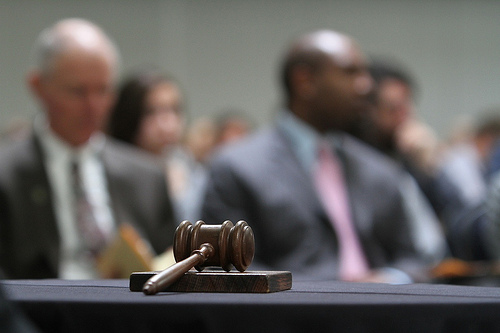98% of plaintiffs’ lawyers select a jury trial with little thought. You just assume a jury trial will be best for the case. Plaintiffs’ lawyers ask for jury trials without any strategic thought and since it seems everyone does it this way, why should you be any different?
Juries are impossible to predict. Even when you’re convinced the jurors are on your side and paying close attention to each witness, you’re just rolling the dice. Juries can be unpredictable, capricious and arbitrary and many prospective jurors arrive to the courtroom with pre-conceived biases that injury lawsuits are frivolous and bad for everyone (except the plaintiff).
Bench trials are a whole different ballgame. Judges tend to be fair, logical and much more predictable than juries and you’ll face fewer courtroom theatrics from defense counsel in bench trials. Judges can tell a good case from a bad one…and isn’t that exactly what you want?
Getting Permission to Waive Your Clients’ Right to a Jury Trial
For the past 15 years, we have recommended that our clients waive their right to a jury trial. But you have to make sure you receive your clients’ permission to waive their right to a jury trial.
Here is the acknowledgement form that we use:
Your Right to a Jury Trial
After depositions are completed, we will request a trial date and at that time, you have the right to select a trial by jury or a non-jury trial (also known as a “bench trial”). It is your constitutional right to a jury trial, and we want to make sure you have all of the information that you need to make this decision.
We will explain both options (i.e., jury or non-jury trial) and make our recommendation. However, we are only making a recommendation and you have complete authority to make the choice that you feel is best for your case.
What is a Trial by Jury?
A jury consists of 8 persons who are randomly selected to listen to the witnesses and evidence and decide what witnesses and evidence are credible and worthy of belief. At the end of the trial, 2 of the jurors are excused (known as “alternate jurors”) and 6 of the jurors are sent to the deliberation room to decide upon a verdict.
Once they complete their deliberations, the jurors will render a verdict that determines whether you win or lose your trial. 5 of the 6 jurors must agree upon the verdict.
What is a Non-Jury Trial?
You have the right to waive your right to a jury trial. When all of the parties (i.e., plaintiffs and defendants) waive their right to a jury trial, the facts and evidence will be heard by a Judge—this is known as a “bench trial”.
During a bench trial, there is no jury and the Judge is the sole finder of fact regarding the truthfulness of the witnesses and evidence. Instead of 6 jurors reaching a verdict, there is only 1 person, the Judge, who will render the final Decision that determines the outcome.
Differences between a Jury Trial and Non-Jury Trial
Juries can be very unpredictable. Even when the facts and evidence appear strongly in your favor, juries may disregard the evidence and base their verdict upon facts that are irrelevant.
Juries tend to have biases against personal injury victims due to publicity that inaccurately portrays our civil justice system, i.e., McDonald’s spilt coffee case. Many of the prospective jurors have pre-conceived notions that malpractice lawsuits are frivolous. For these reasons, you may begin the trial with the odds strongly favoring the defense.
On the other hand, Judges tend to be rational, logical and much more predictable than juries. Most judges have presided over many trials during their career and as a result, they tend to be very good as assessing the merit of a case. Judges rarely have pre-conceived biases and prejudices against malpractice and personal injury law that jurors often have.
Overall, non-jury trials tend to have fewer courtroom theatrics from defense counsel and result in more rational and predictable outcomes.
Our Recommendation
We believe that non-jury trials are better for your case. For this reason, we recommend that our clients waive the right to a jury trial. Of course, if you want a jury trial, we will respect your decision.
Even when you waive your right to a jury trial, the defense also has the right to a jury trial. It is very likely that the defendants will serve a “Demand for a “Jury Trial” within 15 days of a waiver of your right to a jury trial and if they request a jury, you will have a jury trial.
Your Decision
Please confirm your choice for a jury or non-jury trial by placing a checkmark next to the appropriate box below, sign and date below your decision and return this acknowledgment to John H. Fisher, P.C., 278 Wall Street, Kingston, New York 12401, Attn.: Corina Skidmore.
Thank you for the opportunity to represent you.
I want a jury trial: ___
I want a non-jury trial ___
_____________________________ Dated: ___________________
Client
_____________________________ Dated: ___________________
Client
photo credit: CA Supreme Court – 11 via photopin (license)
